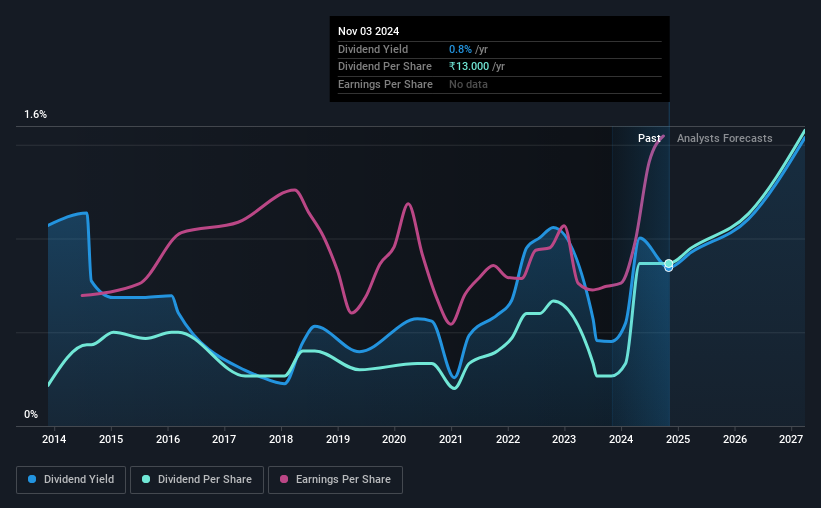- India
- /
- Consumer Durables
- /
- NSEI:SYMPHONY
Here's What We Like About Symphony's (NSE:SYMPHONY) Upcoming Dividend

Some investors rely on dividends for growing their wealth, and if you're one of those dividend sleuths, you might be intrigued to know that Symphony Limited (NSE:SYMPHONY) is about to go ex-dividend in just 3 days. The ex-dividend date is one business day before a company's record date, which is the date on which the company determines which shareholders are entitled to receive a dividend. The ex-dividend date is of consequence because whenever a stock is bought or sold, the trade takes at least two business day to settle. In other words, investors can purchase Symphony's shares before the 7th of November in order to be eligible for the dividend, which will be paid on the 25th of November.
The company's next dividend payment will be ₹2.00 per share. Last year, in total, the company distributed ₹13.00 to shareholders. Calculating the last year's worth of payments shows that Symphony has a trailing yield of 0.8% on the current share price of ₹1533.85. We love seeing companies pay a dividend, but it's also important to be sure that laying the golden eggs isn't going to kill our golden goose! As a result, readers should always check whether Symphony has been able to grow its dividends, or if the dividend might be cut.
Check out our latest analysis for Symphony
Dividends are usually paid out of company profits, so if a company pays out more than it earned then its dividend is usually at greater risk of being cut. That's why it's good to see Symphony paying out a modest 38% of its earnings. A useful secondary check can be to evaluate whether Symphony generated enough free cash flow to afford its dividend. It distributed 32% of its free cash flow as dividends, a comfortable payout level for most companies.
It's encouraging to see that the dividend is covered by both profit and cash flow. This generally suggests the dividend is sustainable, as long as earnings don't drop precipitously.
Click here to see the company's payout ratio, plus analyst estimates of its future dividends.

Have Earnings And Dividends Been Growing?
Companies with consistently growing earnings per share generally make the best dividend stocks, as they usually find it easier to grow dividends per share. If earnings fall far enough, the company could be forced to cut its dividend. That's why it's comforting to see Symphony's earnings have been skyrocketing, up 21% per annum for the past five years. Symphony is paying out less than half its earnings and cash flow, while simultaneously growing earnings per share at a rapid clip. Companies with growing earnings and low payout ratios are often the best long-term dividend stocks, as the company can both grow its earnings and increase the percentage of earnings that it pays out, essentially multiplying the dividend.
Many investors will assess a company's dividend performance by evaluating how much the dividend payments have changed over time. Symphony has delivered 15% dividend growth per year on average over the past 10 years. It's great to see earnings per share growing rapidly over several years, and dividends per share growing right along with it.
The Bottom Line
Has Symphony got what it takes to maintain its dividend payments? It's great that Symphony is growing earnings per share while simultaneously paying out a low percentage of both its earnings and cash flow. It's disappointing to see the dividend has been cut at least once in the past, but as things stand now, the low payout ratio suggests a conservative approach to dividends, which we like. Overall we think this is an attractive combination and worthy of further research.
On that note, you'll want to research what risks Symphony is facing. To help with this, we've discovered 2 warning signs for Symphony that you should be aware of before investing in their shares.
Generally, we wouldn't recommend just buying the first dividend stock you see. Here's a curated list of interesting stocks that are strong dividend payers.
New: Manage All Your Stock Portfolios in One Place
We've created the ultimate portfolio companion for stock investors, and it's free.
• Connect an unlimited number of Portfolios and see your total in one currency
• Be alerted to new Warning Signs or Risks via email or mobile
• Track the Fair Value of your stocks
Have feedback on this article? Concerned about the content? Get in touch with us directly. Alternatively, email editorial-team (at) simplywallst.com.
This article by Simply Wall St is general in nature. We provide commentary based on historical data and analyst forecasts only using an unbiased methodology and our articles are not intended to be financial advice. It does not constitute a recommendation to buy or sell any stock, and does not take account of your objectives, or your financial situation. We aim to bring you long-term focused analysis driven by fundamental data. Note that our analysis may not factor in the latest price-sensitive company announcements or qualitative material. Simply Wall St has no position in any stocks mentioned.
About NSEI:SYMPHONY
Symphony
Manufactures and trades in residential, commercial, and industrial air coolers and other appliances in India and internationally.
Outstanding track record with flawless balance sheet and pays a dividend.
Similar Companies
Market Insights
Community Narratives





